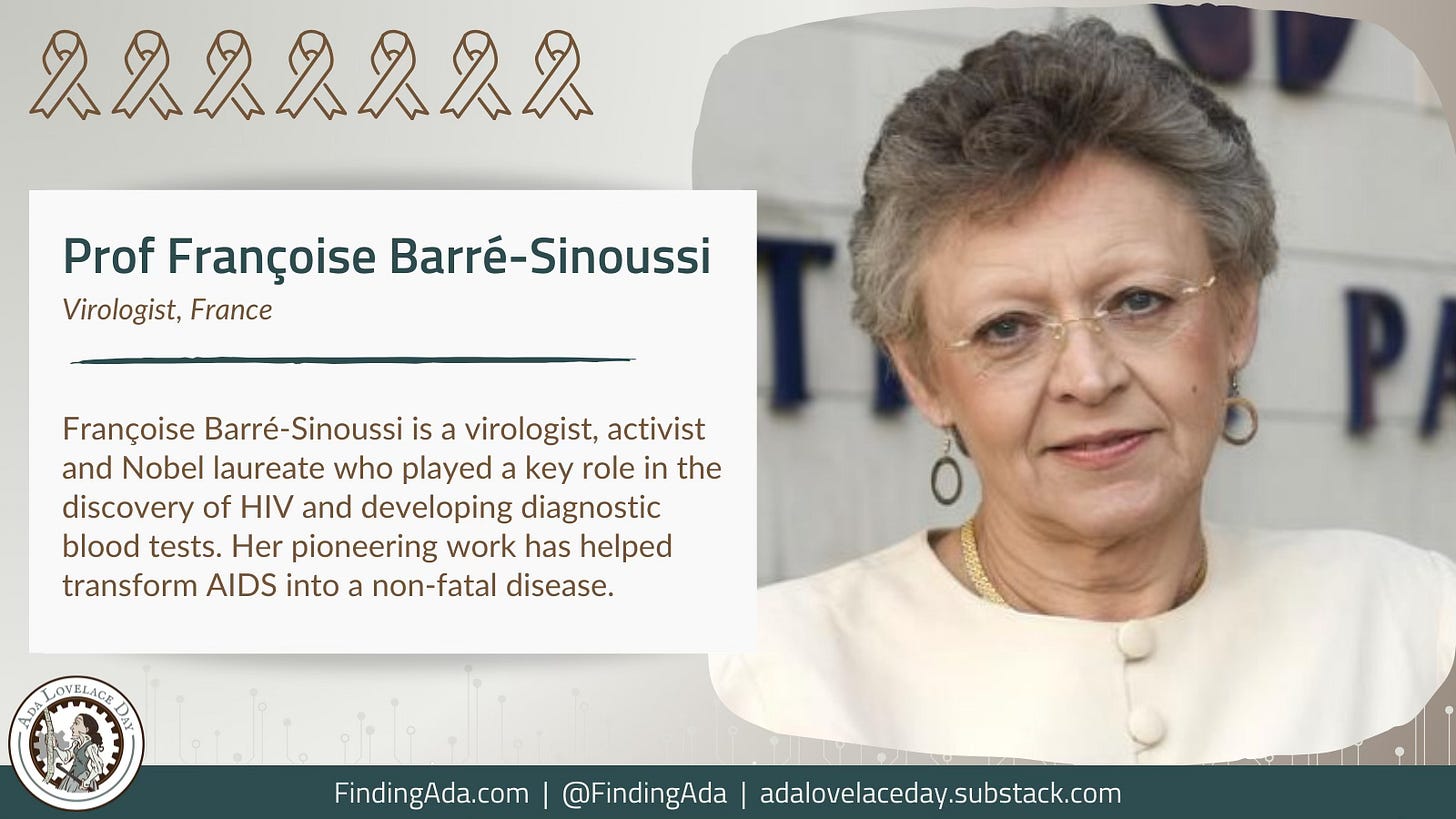Prof Françoise Barré-Sinoussi, Virologist
Françoise Barré-Sinousi is a French virologist who co-discovered the human immunodeficiency virus (HIV) in 1983.
Professor Françoise Barré-Sinoussi
Françoise Barré-Sinousi is a French virologist who, alongside colleagues at the Institut Pasteur in Paris, discovered the human immunodeficiency virus (HIV) in 1983. Now Emeritus Professor at the Institut Pasteur, Barré-Sinousi has dedicated her career as a scientist and activist to helping stop the spread of AIDS.
Barré-Sinoussi grew up in Paris, where she was born in 1947. As a biomedical science student at the University of Paris, she began volunteering in Jean-Claude Chermann’s lab at the Institut Pasteur. She later returned to this lab after earning her PhD, where she researched the link between retroviruses and cancer.
In 1982, Barré-Sinoussi’s unit at the Institut Pasteur received a call from a French clinician. A mysterious and devastating new illness was driving people, predominantly gay men, into Paris hospitals. The clinician wanted to know whether a retrovirus could be behind this unknown disease. By the following year, the 35-year-old Barré-Sinoussi had detected enzyme activity that suggested – for the first time – that AIDS symptoms may be caused by a virus.
Working with Chermann, Luc Montagnier and others, Barré-Sinoussi isolated and grew a retrovirus from a biopsied swollen lymph node of a patient at risk for AIDS. This would later be named the human immunodeficiency virus. The team’s findings were confirmed in 1984, a step that allowed blood tests to be administered to diagnose and help control the spread of HIV. Their discovery also laid the groundwork for antiretroviral medications, which transformed AIDS from a death sentence into a chronic but manageable disease.
In the mid-1980s, Barré-Sinoussi travelled to Africa to see how AIDS was affecting patients across the continent. Her experiences there motivated her to work extensively in Africa and southeast Asia throughout her career, contributing to AIDS education and helping establish test and treatment centres. She co-founded the International AIDS Society (IAS) in 1988, setting up her own lab at the Institut Pasteur the same year. She has described herself as an activist as well as a scientist, saying: “There has been enormous scientific progress – and yet people are still dying of AIDS. How can I accept this? I cannot. It’s a matter of equality. Everybody has a right to live.”
In 2008, 25 years after they identified the cause of AIDS, Barré-Sinoussi and Montagnier were awarded the Nobel Prize in Physiology or Medicine. “Never before has science and medicine been so quick to discover, identify the origin and provide treatment for a new disease entity,” read the award’s announcement.
Barré-Sinoussi authored and co-authored 270 original publications over her career, furthering understanding in areas including mother-to-child HIV transmission and the adaptive immune response to viral infection. French mandatory retirement laws forced her to cease active research when she turned 68 in 2015, but she remains a tireless advocate for people with AIDS, holding senior positions in organisations including the Institut Pasteur and Inserm (the French National Institute of Health and Medical Research).
Barré-Sinoussi’s research and activism has enabled life-saving scientific advancements and shaped policy on the treatment of people living with HIV. But when reflecting on her individual contribution to the fight against AIDS, she is pragmatic. “We are all in it together, and we each make up a tiny piece of the puzzle,” she has said. “That’s all I am: a piece of the puzzle.”
She has received more than 10 major awards in addition to her Nobel Prize, and is a Grand Officer in France’s National Order of the Legion of Honour.
Further Reading
Françoise Barré-Sinousi, Wikipedia
Françoise Barré-Sinoussi: Nobel Prize In Physiology Or Medicine 2008, Nobel Prize
From discovery to a cure: A conversation with Françoise Barré-Sinoussi, IAS
The Extraordinary Path of Nobel Laureate Françoise Barré-Sinoussi, Herlinde Koelbl, The MIT Press Reader, 21 August 2023
An Inspiring Journey of Hope and Persistence: Life Lessons with Françoise Barré-Sinoussi, Kiho Tanaka, Paula M. Cevaal and Rachel D. Pascoe, Viruses, 21 May 2022
Written by Moya Crockett, with thanks to Stylist for their support.




